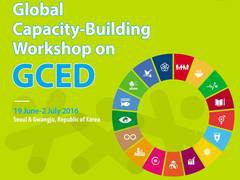
GCED Basic Search Form
Quick Search
Close
You are here
News
L'UNESCO lance une nouvelle formation pour aider les éducateurs à lutter contre l'extrémisme violent
Post date:
2016/06/23

UNESCO and the Asia Pacific Centre of Education for Intercultural Understanding (APCEIU) are developing a new partnership to boost training for educators worldwide on the prevention of violent extremism.
As part of APCIEU’s Global Citizenship Education international and regional trainings new modules will be introduced by UNESCO to sensitize educators to the issue of violent extremism and to the educational measures that can build learners’ resilience to extremist narratives.
In addition, the APCEIU and UNESCO have agreed to introduce sessions dealing with the history of genocides, in particular the Holocaust, as a means to raise awareness of the dangers of mass violence in contemporary societies, and help young people become critical thinkers able to oppose group-targeted violence.
Regional seminars to follow opening workshop
The first training seminar, titled Global Capacity-Building Workshop is taking place in Seoul, Korea, from 19 June to 2 July 2016. It gathers teacher-trainers and teachers from 26 countries including Mongolia, Cambodia, Uganda, Lebanon and Colombia and covers all aspects of Global Citizenship Education, from policy design to pedagogy and teaching practices, in workshops partly led by UNESCO.
It will also include sessions conducted in partnership with the Radicalisation Awareness Network (RAN), a European Union body supporting youth stakeholders confronted with violent extremism, and of the United States Holocaust Memorial Museum, one of the world’s leading institutions for Holocaust education and research and genocide prevention. The workshop will be followed throughout 2016 and 2017 by several similar training seminars with a more regional scope.
UNESCO is engaged in a programme to contribute to the prevention of violent extremism through education, within its work on Global Citizenship Education. This includes the development of guidance for policy-makers and to support the work of teachers in the classroom and capacity-building for education stakeholders.
URL:
http://www.unesco.org/new/en/media-services/single-view/news/unesco_launches_new_training_for_educators_to_prevent_violen/#.V2srEPmLSUk
